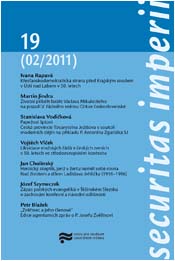Zápas polských evangelíků v Těšínském Slezsku o zachování konfesní a národní odlišnosti v poválečném Československu
The struggle of Polish evangelicals in Cieszyn Silesia to maintain denominational and national differences in post-war Czechoslovakia
Author(s): Józef SzymeczekSubject(s): Christian Theology and Religion, Post-War period (1950 - 1989), History of Communism, Other Christian Denominations
Published by: Ústav pro studium totalitních režimů
Keywords: evangelical Catholics;Poland;Cieszyn Silesia;communism
Summary/Abstract: This article deals with the post-war fate of Polish evangelicals in the Czechoslovak part of Cieszyn Silesia (Těšín Silesia). As a result of the intertwining of religious and political questions with national issues, the Augsburg Evangelical Church was established here after the collapse of the Austro-Hungarian Empire. This was an institution that was wholly Polish in nature in the interwar period. In the post-war years of 1945-1950, the church had to defend its autonomy against efforts by Czech evangelicals to subsume Silesian evangelicals into the structure of the Moravian Church. The price for maintaining their own autonomy was that that church became subordinate to the communist government and that it lost its hitherto predominantly Polish character. It also gave rise to tensions inside the church between its official leadership and missionary groups representing neo-pietist or charismatic forms of religion.
Journal: Securitas imperii
- Issue Year: 2011
- Issue No: 19
- Page Range: 218-236
- Page Count: 18
- Language: Czech

